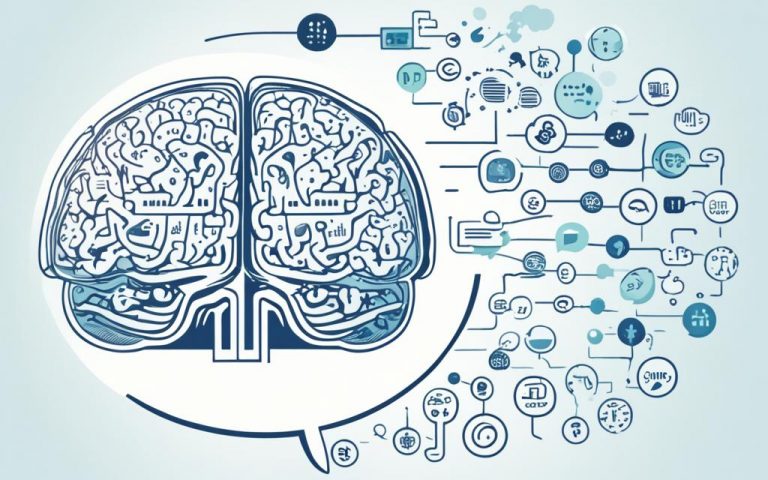Cognitive Behavioural Therapy Discover What is Used For
Cognitive behavioural therapy (CBT) is a talking therapy that helps individuals manage their problems by changing the way they think and behave. It is primarily used to treat anxiety and depression but has also been proven effective for other mental and physical health conditions. CBT works by breaking down overwhelming problems into smaller parts and teaching individuals how to change negative patterns of thinking and behaviours. Unlike some other therapies, CBT focuses on current problems and provides practical strategies for daily improvement.
Key Takeaways:
- Cognitive behavioural therapy (CBT) helps individuals manage their problems by changing their thoughts and behaviours.
- CBT is primarily used to treat anxiety and depression but can be effective for a range of mental and physical health conditions.
- CBT breaks down problems into smaller parts and teaches practical strategies for daily improvement.
- CBT focuses on current problems and provides tools for individuals to change negative patterns of thinking and behaviours.
- CBT offers practical strategies that can be applied long after the therapy sessions have ended.
Understanding the Principles of CBT
Cognitive Behavioral Therapy (CBT) is a powerful form of talk therapy that has been proven effective in treating a wide range of mental health conditions. The principles of CBT are rooted in the understanding that our thoughts, feelings, physical sensations, and actions are interconnected. This means that the way we think and behave can greatly influence how we feel, both mentally and physically.
CBT aims to help individuals identify and challenge faulty or unhelpful ways of thinking and learned patterns of unhelpful behavior. By doing so, individuals can break free from negative cycles and develop healthier coping skills. The ultimate goal of CBT is to improve overall well-being and enhance daily functioning.
“CBT aims to help individuals identify and challenge faulty or unhelpful ways of thinking and learned patterns of unhelpful behavior.”
During CBT sessions, individuals work collaboratively with a therapist to dissect their problems into separate parts, such as thoughts, physical feelings, and actions. These areas are then analyzed to determine if they are unrealistic or unhelpful. Therapists guide individuals in developing strategies to change these patterns and adopt more positive and adaptive ways of thinking and behaving.
| Benefits of CBT | Limitations of CBT |
|---|---|
|
|
It is important to note that CBT is not a one-size-fits-all approach. The effectiveness of CBT may vary depending on the individual and the nature of their specific mental health condition. However, it has been extensively researched and has consistently demonstrated positive outcomes for many individuals.
Key Takeaways:
- Cognitive Behavioral Therapy (CBT) is a form of talk therapy that explores the connection between thoughts, feelings, physical sensations, and actions.
- The principles of CBT involve identifying and challenging negative patterns of thinking and behavior to improve overall well-being.
- CBT sessions are focused on breaking down problems into separate parts, analyzing them, and developing strategies for positive change.
- CBT has several benefits, such as providing practical strategies for daily life, but also has limitations and may not be suitable for everyone.
Next, we will explore the common uses of CBT and the mental health conditions it can effectively treat.
Common Uses for CBT
Cognitive behavioral therapy (CBT) is a versatile treatment that has been proven effective for a variety of mental health conditions. It offers practical strategies for individuals to address their challenges and improve their overall well-being. Here are some common mental health conditions for which CBT is frequently used:
- Depression: CBT helps individuals identify negative thought patterns and behaviors contributing to their depression, and develop more positive and adaptive coping strategies.
- Anxiety disorders: CBT targets irrational fears and worries, teaching individuals techniques to manage anxiety and challenge distorted thinking.
- Eating disorders: CBT addresses the underlying beliefs and attitudes surrounding food, body image, and weight, helping individuals develop healthier thought patterns and behaviors.
- Obsessive-compulsive disorder (OCD): CBT focuses on breaking the cycle of obsessions and compulsions by challenging irrational thoughts and gradually exposing individuals to their fears.
- Post-traumatic stress disorder (PTSD): CBT helps individuals process and reframe traumatic experiences, reducing the intensity and impact of intrusive memories and flashbacks.
- Phobias: CBT assists individuals in confronting and overcoming their fears by gradually exposing them to the object or situation causing anxiety.
- Psychosis: CBT can complement medication by helping individuals manage distressing symptoms, challenge delusional beliefs, and develop coping strategies.
- Sleep problems: CBT targets behaviors and thoughts that interfere with sleep, promoting healthy sleep habits and relaxation techniques.
These are just a few examples of the wide range of mental health conditions that can benefit from CBT. By working with a trained therapist, individuals can gain the tools and skills necessary to overcome their challenges and improve their mental wellness.
| Condition | Treatment Focus | Benefits |
|---|---|---|
| Depression | Identifying negative thought patterns and developing coping strategies | Improved mood and overall functioning |
| Anxiety disorders | Challenging irrational fears and worries, managing anxiety | Reduced anxiety symptoms and improved quality of life |
| Eating disorders | Addressing beliefs and attitudes related to food, body image, and weight | Healthier thought patterns and behaviors |
| Obsessive-compulsive disorder (OCD) | Breaking the cycle of obsessions and compulsions, challenging irrational thoughts | Reduced OCD symptoms and improved daily functioning |
| Post-traumatic stress disorder (PTSD) | Processing and reframing traumatic experiences, reducing the impact of intrusive memories | Improved ability to cope with trauma-related symptoms |
| Phobias | Gradual exposure to fears, challenging anxiety-provoking thoughts | Reduced fear and avoidance behaviors |
| Psychosis | Managing distressing symptoms, challenging delusional beliefs | Improved symptom management and overall functioning |
| Sleep problems | Addressing behaviors and thoughts that interfere with sleep | Improved sleep quality and overall well-being |
What to Expect During CBT Sessions
When you attend cognitive behavioral therapy (CBT) sessions, you can expect a structured and collaborative approach to help you address your concerns. CBT sessions typically take place once a week or once every two weeks, with each session lasting between 30 and 60 minutes. The number of sessions needed will vary depending on your individual needs and goals.
During CBT sessions, you will work closely with a trained therapist who will guide you through the process. The therapist will help you break down your problems into smaller parts, such as thoughts, physical feelings, and actions. These areas will be carefully analyzed to determine if they are unrealistic or unhelpful, and the therapist will assist you in developing practical strategies to change these patterns.
A key aspect of CBT is its focus on the present and the practical application of strategies to tackle daily challenges. You will learn techniques to identify and challenge negative thinking patterns, develop healthier coping skills, and address unhelpful behaviors. The therapist will encourage you to actively participate in your treatment by completing assignments and practicing new skills outside of the therapy sessions.

The Benefits of CBT Sessions
CBT sessions offer several advantages. The structured nature of CBT allows for a clear framework that can be tailored to your specific needs. The practical strategies you learn in therapy can be applied immediately to your everyday life, helping you make positive changes and improve your overall well-being.
Additionally, CBT is often more time-limited than other therapies, meaning you may see results in a shorter period. The collaborative nature of CBT fosters a strong therapeutic relationship, allowing you and your therapist to work together towards your goals. With CBT, you have the opportunity to gain a deeper understanding of your thoughts, emotions, and behaviors, empowering you to make lasting changes.
| Pros of CBT | Cons of CBT |
|---|---|
|
|
Pros and Cons of Cognitive Behavioral Therapy (CBT)
When considering cognitive behavioral therapy (CBT) as a potential treatment option, it’s important to weigh the pros and cons. CBT has several advantages that make it a popular choice for individuals seeking therapy. One of the key benefits of CBT is its relatively short treatment duration compared to other therapies. This means that individuals can see improvements in their mental health within a shorter time frame, allowing them to regain control of their lives more quickly.
Another advantage of CBT is its highly structured nature. The therapy provides individuals with practical strategies and tools that they can apply to their everyday lives. By learning how to identify and challenge negative thought patterns and behaviors, individuals can develop coping skills that empower them to effectively manage their problems. This structured approach enhances the overall effectiveness of CBT and promotes long-term positive change.
However, it’s important to consider the potential drawbacks of CBT as well. One limitation is that CBT requires commitment and active participation from the individual. It involves engaging in therapy sessions, completing homework assignments, and actively implementing the strategies learned. This level of involvement may not be suitable for everyone or may be challenging for individuals with limited time or resources.
Additionally, CBT may not be appropriate for individuals with complex mental health needs or those who require a more comprehensive treatment approach. It primarily focuses on addressing current problems and may not adequately address wider systemic or family issues that may contribute to an individual’s difficulties. In such cases, a different therapy approach or a combination of treatments may be more beneficial.
Pros and Cons of CBT: At a Glance
| Pros of CBT | Cons of CBT |
|---|---|
|
|
While CBT has its pros and cons, it remains a widely used and effective treatment option for various mental health conditions. It is essential to consult with a qualified therapist or healthcare professional to determine if CBT is the right fit for your specific needs and circumstances.
Finding a CBT Therapist
If you’re considering cognitive behavioral therapy (CBT) as a treatment option for your mental health concerns, finding a qualified therapist is crucial. Here are several ways to locate a CBT therapist:
1. NHS Talking Therapies Service
The NHS provides access to CBT through its Talking Therapies service. You can self-refer to this service or request a referral from your GP. Simply contact your local NHS Psychological Therapies service or visit their website to find out more about self-referral or GP referral options in your area.
2. British Association for Behavioural and Cognitive Psychotherapies (BABCP)
The BABCP website offers a directory of therapists trained in CBT. By searching their database, you can find accredited CBT practitioners near you. This directory provides detailed information about each therapist’s qualifications and areas of expertise, helping you make an informed decision.
3. British Psychological Society (BPS) Directory
The BPS directory of chartered psychologists includes professionals who specialize in CBT. You can visit the BPS website and search their directory to find a psychologist who offers CBT services. The directory provides contact information, allowing you to reach out directly to the psychologists for more information.
Remember to consider factors such as geographic location, specialization, and availability when selecting a CBT therapist. It’s important to find someone you feel comfortable working with and who has experience in treating the specific mental health condition you’re seeking help for.
What is CBT and How Does It Work?
Cognitive behavioral therapy (CBT) is a type of talking therapy that aims to help individuals recognize and challenge negative thoughts and behaviors, while developing problem-solving skills and building confidence in their abilities. CBT focuses on the connection between thoughts, beliefs, attitudes, feelings, and actions, and it provides individuals with practical strategies to improve their well-being.
CBT sessions involve working collaboratively with a therapist to identify and change thought patterns and behaviors that may be contributing to emotional distress or impacting daily functioning. By breaking down overwhelming problems into manageable parts, individuals can gain a deeper understanding of how their thoughts and behaviors are interconnected and how they can make positive changes.
During CBT sessions, individuals may explore various techniques such as cognitive restructuring, which involves challenging and replacing negative thoughts with more balanced and realistic ones. Additionally, individuals may engage in behavioral experiments to test out new ways of thinking and behaving. Outside of sessions, individuals may be asked to complete exercises and activities to reinforce the skills learned in therapy.
Benefits of CBT:
- Helps individuals recognize and challenge negative thoughts and behaviors
- Provides practical strategies to improve coping skills and problem-solving abilities
- Focuses on the connection between thoughts, feelings, physical sensations, and actions
- Collaborative approach between the individual and therapist
- Structured therapy sessions with clear goals and strategies
“CBT gives individuals the tools to better understand their thoughts and behaviors and empowers them to make positive changes in their lives.” – Dr. Sarah Johnson, Clinical Psychologist
By actively participating in CBT, individuals can gain valuable insights into their own thoughts and behaviors, and develop the skills necessary to overcome challenges and improve their overall well-being.
| Pros | Cons |
|---|---|
| Relatively short treatment duration | Requires commitment and active participation |
| Highly structured approach | May be time-consuming |
| Provides practical strategies for daily life | May not be suitable for complex mental health needs |
| As effective as medication for some mental health problems | May initially cause discomfort as individuals confront emotions and anxieties |
It is important to note that CBT may not be suitable for everyone or every condition. If CBT does not produce desired results, it is recommended to explore alternative treatment options or consult with a healthcare professional.

Using CBT for Different Mental Health Problems
When it comes to treating mental health conditions, cognitive behavioral therapy (CBT) has proven to be an effective approach. CBT can provide support and strategies for a range of issues, including anger problems, anxiety and panic attacks, bipolar disorder, depression, drug or alcohol problems, eating problems, hoarding, obsessive-compulsive disorder (OCD), perinatal mental health problems, phobias, post-traumatic stress disorder (PTSD), psychosis, schizoaffective disorder, schizophrenia, self-harm, sleep problems, and stress. With its evidence-based techniques, CBT offers tailored solutions for specific problems and can be a valuable tool in improving mental wellness.
| Mental Health Condition | CBT Application |
|---|---|
| Anger Problems | Helps individuals identify triggers and develop healthier ways to manage and express anger. |
| Anxiety and Panic Attacks | Teaches individuals relaxation techniques, cognitive restructuring, and exposure and response prevention methods. |
| Bipolar Disorder | Assists individuals in managing mood swings, identifying early warning signs, and developing coping strategies. |
| Depression | Targets negative thoughts and behaviors, helping individuals challenge and modify them to improve mood and functioning. |
| Eating Problems | Addresses distorted thoughts and beliefs about food, body image, and weight, while promoting healthier habits and attitudes. |
| Hoarding | Focuses on cognitive restructuring, organizational skills training, and exposure therapy to address hoarding behaviors. |
| OCD | Utilizes exposure and response prevention techniques to help individuals manage intrusive thoughts and compulsive behaviors. |
| Perinatal Mental Health Problems | Supports women during pregnancy and after childbirth, addressing issues such as anxiety, depression, and adjustment difficulties. |
| Phobias | Employs exposure therapy to gradually and safely confront and overcome specific fears or phobias. |
| PTSD | Uses trauma-focused CBT to help individuals process traumatic experiences and develop effective coping strategies. |
| Psychosis | Aids individuals in challenging delusions or hallucinations, managing symptoms, and promoting recovery. |
| Schizoaffective Disorder | Combines elements of CBT for schizophrenia and mood disorders to address both aspects of this condition. |
| Schizophrenia | Helps individuals manage symptoms, develop coping strategies, and improve daily functioning and quality of life. |
| Self-Harm | Addresses underlying emotions, thoughts, and behaviors associated with self-harming tendencies, promoting healthier coping mechanisms. |
| Sleep Problems | Targets insomnia and other sleep-related issues by addressing negative sleep thoughts and implementing relaxation techniques. |
| Stress | Teaches individuals stress management techniques, problem-solving skills, and effective coping mechanisms. |
CBT offers tailored solutions for specific mental health problems such as angers issues, bipolar disorder, depression, eating problems, OCD, PTSD, and sleep problems. With its evidence-based techniques, it can help individuals challenge negative thoughts and behaviors, develop coping skills, and improve their overall well-being.
It is important to note that different adaptations of CBT may be recommended for specific conditions. For example, trauma-focused CBT is commonly used for PTSD, while dialectical behavior therapy (DBT) incorporates CBT techniques to address self-harm and borderline personality disorder. Consulting with a mental health professional can provide further guidance on the most appropriate CBT approach for individual needs and circumstances.
Trying CBT Independently
If you are unable to access formal cognitive behavioral therapy (CBT) treatment immediately or want to supplement your previous therapy, you can explore self-help options. Many individuals have found success in attempting CBT independently using available resources such as computer programs, workbooks, or online services. This can be a useful option while waiting for formal treatment or as a way to continue practicing the skills learned in therapy.
To get started with self-help CBT, it is recommended to approach a doctor or healthcare team for guidance. They can provide you with access to online CBT programs or recommend books and worksheets that are specifically tailored to your needs. These resources can guide you through the CBT process, teaching you valuable techniques and strategies for challenging negative thoughts and behaviors.
“Self-help CBT resources can be a valuable tool for individuals seeking to actively manage their mental health. They offer flexibility and convenience, allowing individuals to work at their own pace and revisit the material whenever needed.” – Dr. Jane Smith, Clinical Psychologist
While self-help CBT can be effective for some individuals, it is important to note that it may not be suitable for everyone or all mental health conditions. If you find that self-help resources are not providing the desired results or if your symptoms persist or worsen, it is crucial to seek professional help. A qualified therapist or mental health professional can provide personalized guidance and support to address your specific needs.
What to Do if CBT Doesn’t Work
If cognitive behavioral therapy (CBT) doesn’t produce the desired results for you, it’s important not to lose hope. While CBT is a widely used and effective treatment, it may not work for everyone or every condition. If you find yourself in this situation, there are alternative therapies and options to explore.
Alternative therapies can provide different approaches and techniques that may better suit your needs. These therapies include dialectical behavior therapy (DBT), acceptance and commitment therapy (ACT), psychodynamic therapy, mindfulness-based cognitive therapy (MBCT), and eye movement desensitization and reprocessing (EMDR), among others. It is worth discussing these options with your therapist or healthcare provider to determine the most suitable alternative for you.
Additionally, some individuals may benefit from a combination of therapies, such as medication and CBT, or multiple types of therapy concurrently. It is essential to work closely with your healthcare team to explore what options are available and would be most effective for your specific situation.
| Alternative Therapies | Description |
|---|---|
| Dialectical Behavior Therapy (DBT) | Focuses on developing skills to manage emotions, improve relationships, and promote mindfulness. |
| Acceptance and Commitment Therapy (ACT) | Helps individuals accept their thoughts and feelings while taking action towards their values and goals. |
| Psychodynamic Therapy | Explores unconscious thoughts and childhood experiences to address underlying issues. |
| Mindfulness-Based Cognitive Therapy (MBCT) | Combines mindfulness practices and cognitive therapy to help individuals manage negative thoughts and prevent relapse. |
| Eye Movement Desensitization and Reprocessing (EMDR) | Utilizes bilateral stimulation to process traumatic memories and alleviate distressing symptoms. |
Remember, everyone’s journey is unique, and what works for one person may not work for another. It’s essential to keep an open mind and not give up on finding the right approach for your mental health and well-being.
Benefits of CBT Backed by Research
Research evidence strongly supports the effectiveness of Cognitive Behavioral Therapy (CBT) in improving mental health outcomes for individuals dealing with various mental health problems. Numerous studies have consistently shown CBT to be as effective as, or even more effective than, other therapies and medication options.
“CBT is one of the most extensively researched therapies, with a large body of evidence supporting its effectiveness across a wide range of mental health conditions.”
One study published in the Journal of Consulting and Clinical Psychology found that CBT significantly reduced symptoms of depression and anxiety in individuals with major depressive disorder and generalized anxiety disorder. The study concluded that CBT had lasting effects and could be considered a first-line treatment option.
Another meta-analysis, published in the American Journal of Psychiatry, reviewed 269 studies and concluded that CBT was effective for various mental health conditions, including bipolar disorder, panic disorder, social anxiety disorder, and post-traumatic stress disorder.
Table: Effectiveness of CBT in Treating Mental Health Conditions
| Mental Health Condition | Effectiveness of CBT |
|---|---|
| Depression | Highly Effective |
| Anxiety Disorders | Highly Effective |
| Bipolar Disorder | Effective |
| Panic Disorder | Effective |
| Social Anxiety Disorder | Effective |
| Post-Traumatic Stress Disorder | Effective |
CBT’s evidence-based approach, coupled with its adaptability to different mental health conditions, makes it a highly recommended therapy option. It empowers individuals to actively participate in their own treatment, providing them with the tools and strategies to challenge negative thoughts and behaviors, improve coping skills, and enhance overall well-being.
Whether you’re struggling with depression, anxiety, bipolar disorder, or any other mental health condition included in the extensive research on CBT, rest assured that this therapy has a strong foundation of evidence to support its effectiveness.
Conclusion
Cognitive behavioural therapy (CBT), a widely used and effective treatment for various mental health conditions, offers individuals the opportunity to manage their problems, enhance their well-being, and improve their daily functioning. By addressing negative patterns of thinking and behaviours, CBT equips individuals with practical strategies that can be applied long after therapy sessions have ended, promoting mental wellness.
Whether accessed through the National Health Service (NHS) or privately, CBT’s evidence-based approach sets it apart as a therapeutic option. It provides individuals with the tools to break down overwhelming problems into manageable parts and teaches them how to change unhelpful patterns. By challenging negative thoughts and behaviours, individuals can experience significant improvements in their mental wellness.
Incorporating CBT into your mental health journey can help you develop problem-solving skills, build confidence in your abilities, and foster positive changes in your life. With its focus on practical strategies and its ability to treat a wide range of mental health conditions, CBT offers hope and empowerment. Whether you’re struggling with anxiety, depression, or other mental health challenges, CBT can be a valuable resource on your path to mental wellness.
FAQ
What is cognitive behavioral therapy (CBT) used for?
CBT is primarily used to treat anxiety and depression but has also been proven effective for other mental and physical health conditions.
What are the principles of CBT?
CBT focuses on changing the way individuals think and behave by breaking down overwhelming problems into smaller parts and teaching practical strategies for daily improvement.
What are some common uses for CBT?
CBT has been proven effective in treating various mental health conditions, including depression, anxiety disorders, eating disorders, OCD, PTSD, schizophrenia, and sleep problems.
What can I expect during CBT sessions?
CBT sessions typically occur once a week or once every two weeks and last between 30 and 60 minutes. The therapy usually consists of 6 to 20 sessions, depending on individual needs. During sessions, individuals work with a therapist to analyze thoughts, physical feelings, and actions and develop strategies for change.
What are the pros and cons of CBT?
CBT has advantages such as its relatively short treatment duration, practical strategies for everyday life, and effectiveness in treating some mental health problems. However, it requires commitment and active participation, can be time-consuming, may not be suitable for complex mental health needs, and does not address wider systemic or family problems.
How can I find a CBT therapist?
CBT can be accessed through the NHS via self-referral to a talking therapies service or through a referral from a GP. Private therapy options are also available through registers like the BABCP website or the BPS directory of chartered psychologists.
What is the process of CBT and how does it work?
CBT focuses on the connection between thoughts, beliefs, attitudes, feelings, and actions. It aims to help individuals recognize and challenge negative patterns of thinking and behaviors, develop problem-solving skills, and build confidence in their abilities.
What mental health problems can CBT be used for?
CBT has been found effective for anger problems, anxiety and panic attacks, bipolar disorder, depression, drug or alcohol problems, eating problems, hoarding, OCD, perinatal mental health problems, phobias, PTSD, psychosis, schizoaffective disorder, schizophrenia, self-harm, sleep problems, and stress.
Can I try CBT independently?
While waiting for formal treatment or as a supplement to previous therapy, individuals may attempt CBT independently using computer programs, workbooks, or online services. Professional guidance on self-help resources can provide access to recommended online CBT programs or books and worksheets.
What should I do if CBT doesn’t work for me?
If CBT does not produce desired results, it is important not to blame oneself and to explore alternative options. Other therapies, medications, or combinations of treatments may be more suitable for certain individuals and conditions.
Are there any research-backed benefits of CBT?
Multiple research studies have demonstrated the effectiveness of CBT in improving functioning and quality of life for individuals with various mental health problems. CBT has been shown to be as effective as or more effective than other therapies and medications.
Conclusion
Cognitive behavioral therapy is a widely used and effective treatment for a range of mental health conditions. By changing negative patterns of thinking and behaviors, individuals can learn to manage their problems, improve their well-being, and enhance their daily functioning. Whether accessed through the NHS or privately, CBT offers practical strategies that can be applied long after the therapy sessions have ended.







